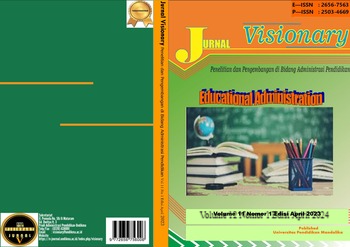Pemanfaatan Rapor Pendidikan Pada Pengembangan Program di SDN Puncak 2
DOI:
https://doi.org/10.33394/vis.v12i1.10610Abstract
Abstract: School is a means of implementing the educational process. As formal educational organizations, schools have a responsibility to improve the quality of education. To guarantee the quality of education, in line with the Minister of National Education Regulation number 19 of 2007 concerning education management standards by primary and secondary education units, education can be said to have an achievement process if it is able to guarantee the quality of education by increasing the intelligence of the nation's life. The meaning of educational report cards is able to describe the condition of educational units throughout Indonesia. To find out how much impact educational report cards have on school development, it is necessary to conduct research on the indicators that influence them. The aim of this research is to find out to what extent the education report card policy helps the program development process at SDN Puncak 2. This research uses qualitative methods where answering problems requires in-depth understanding in the context of time and situation. The data analysis technique in this research uses several techniques, namely observation, interviews and documentation. The instrument used was an interview sheet which consisted of several structured questions related to the research
Key Words: Utilization, Educational Reports, Development
Abstrak: Sekolah adalah sarana dalam pelaksanaan proses pendidikan. Sebagai organisasi pendidikan formal, sekolah memiliki tanggung jawab dalam meningkatkan mutu pendidikan. Untuk menjamin mutu pendidikan tersebut, maka sejalan dengan peraturan menteri pendidikan nasional nomor 19 tahun 2007 tentang standar pengelolaaan pendidikan oleh satuan pendidikan dasar dan menengah maka pendidikan dapat dikatakan memiliki proses pencapaian jika mampu menjamin mutu dengan meningkatkan kecerdasan kehidupan bangsa. Pemaknaan raport pendidikan mampu menggambarkan kondisi satuan pendidikan di seluruh Indonesia Untuk mengetahui seberapa berdampaknya Raport Pendidikan terhadap pengembangan sekolah maka perlu dilakukan penelitian tentang indikator-indikator yang mempengaruhinya. Adapun tujuan dari penelitian ini adalah untuk mengetahui sejauh mana kebijakan rapor pendidikan membantu proses pengembangan program di SDN Puncak 2. Penelitian ini menggunakan metode kualitatif dimana untuk menjawab permasalahan memerlukan pemahaman mendalam dalam konteks waktu juga situasi. Tekhnik analisa data dalam penelitian ini menggunakan beberapa tekhnik yaitu observasi, wawancara dan dokumentasi. Instrumen yang digunakan adalah lembar wawancara yang didalamnya terdiri dari beberapa pertanyaan terstruktur yang berkaitan dengan penelitian.
Kata Kunci: Pemanfaatan, Raport Pendidikan, Pengembangan
References
Ahmad Tanzeh, Metodologi Penelitian Praktis, (Yogyakarta: Teras, 2011), hal. 83 87 88
Arief Furchan, Pengantar Metode Penelitian Kualitatif, (Surabaya: Usaha Nasional, 1992), hal. 21-22
Husaini Usman & Purnomo Setiady Akbar, Metodologi Penelitian Sosial, (Jakarta: PT. Bumi Aksara, 2009), hal. 99
Lexy J Moleong, Metodologi Penelitian Kualitatif, (Bandung: PT Remaja Rosdakarya, 2005), hal. 4
Muchlis. 2002. Kebijakan Publik. (Bogor: Ghalia Indonesia)
Sugiyono. “Metode Penelitian Kuantitatif, Kualitatif, dan Kombinasi (mixed methods). Jakarta. (Bandung: Alfabeta, 2017). Hal 16 247
Suharsimi Arikunto, Prosedur Penelitian Suatu Pendekatan Praktek, Edisi Revisi VI, (Jakarta: PT Rineka Cipta, 2006), hal. 231 91
Zainal Arifin, Penelitian Pendidikan Metode dan Paradigma Baru, (Bandung, PT Remaja Rosdakarya, 2012), hal. 29
Downloads
Published
How to Cite
Issue
Section
Citation Check
License
Authors who publish with this journal agree to the following terms:
- Authors retain copyright and grant the journal right of first publication with the work simultaneously licensed under a Creative Commons Attribution License (CC BY-SA 4.0) that allows others to share the work with an acknowledgment of the work's authorship and initial publication in this journal.Â
- Authors are able to enter into separate, additional contractual arrangements for the non-exclusive distribution of the journal's published version of the work (e.g., post it to an institutional repository or publish it in a book), with an acknowledgment of its initial publication in this journal.
- Authors are permitted and encouraged to post their work online (e.g., in institutional repositories or on their website) prior to and during the submission process, as it can lead to productive exchanges, as well as earlier and greater citation of published work (See The Effect of Open Access).
Â






